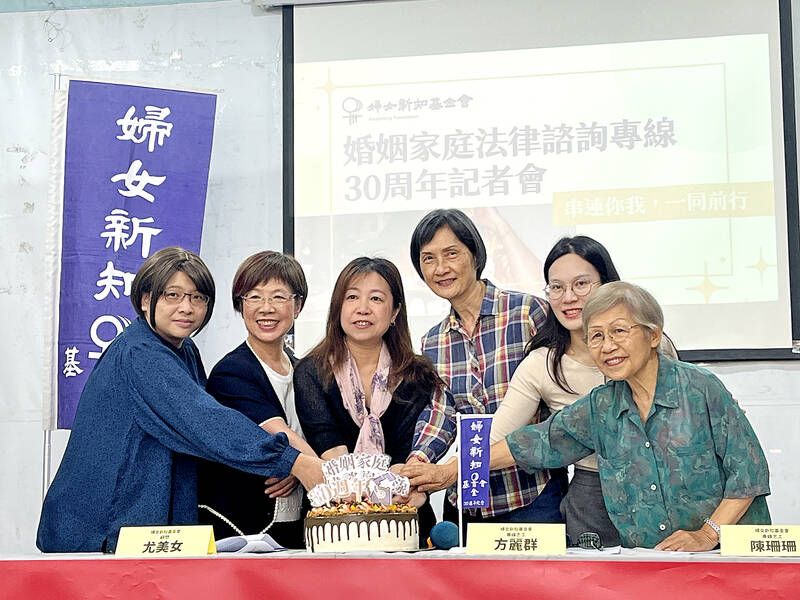Marriage laws need to be amended to improve gender equality, the Awakening Foundation said yesterday, citing the 80,000 calls it has received over 30 years, the majority of which were questions about divorce.
The foundation held a news conference to mark the anniversary of its hotline for legal advice about marriage, with officials saying that important work remains to be done despite significant progress in women’s rights.
Calls to the hotline made in the past decade were predominantly inquiries about divorce, which accounted for 11,943 of the total of 30,990 calls, the officials said.

Photo: Chen Chia-yi, Taipei Times
Questions about children came in next, with 6,577 calls, while property ownership was third at 5,351, they said.
Divorce by mutual consent accounted for 15.5 percent of calls about divorce, 12 percent were about court-ordered divorces, 19.1 percent were about custody arrangements and 10.1 percent were about division of property, they said.
Women made up 86.5 percent of the callers, while men accounted for 12.2 percent — a marked change from a decade earlier when men comprised less than 10 percent of callers, they said.
The foundation’s priority now is to advocate changes in the Civil Code to make it easier for estranged couples to divorce, chairperson Chen Lin-yi (陳令宜) said.
People who for years have not slept under the same roof as their spouse should be released from a functionally dead marriage instead of being stuck in legal limbo without rules governing their rights and responsibilities, she said.
The calls informed many of the foundation’s landmark initiatives following the hotline’s creation in 1994, foundation adviser and former legislator Yu Mei-nu (尤美女) said.
The foundation’s achievements include the right of women to live in a place not of their husband’s choosing, keep their maiden name, matrilineally name their children, possess property they had owned before marriage and share or claim child custody, she said.
Amendments to marriage laws under the Civil Code advocated by the foundation included putting an end to the dissolution of marriage if the husband had an extramarital affair, a provision that caused many women to lose their homes through no fault of their own, Yu said.
The Domestic Violence Prevention Act (家庭暴力防治法), which became law in 1998, was made possible in part due to the foundation’s efforts to deal with familial violence reported by callers, she said.
People aged 31 to 40 accounted for the largest number of callers at 33.9 percent, while those aged 41 to 54 accounted for 26.9 percent and those aged 51 to 60 made up 14.8 percent, the foundation said in a news release.
A total of 75 women have volunteered to staff the call center since the hotline’s founding after studying law on their own or receiving on-the-job training, it said, adding that volunteers serve 14 years on average.
The legal advice hotline receives 60 to 70 calls on average per month, it said.

Chinese Nationalist Party (KMT) Chairman Eric Chu (朱立倫), spokeswoman Yang Chih-yu (楊智伃) and Legislator Hsieh Lung-chieh (謝龍介) would be summoned by police for questioning for leading an illegal assembly on Thursday evening last week, Minister of the Interior Liu Shyh-fang (劉世芳) said today. The three KMT officials led an assembly outside the Taipei City Prosecutors’ Office, a restricted area where public assembly is not allowed, protesting the questioning of several KMT staff and searches of KMT headquarters and offices in a recall petition forgery case. Chu, Yang and Hsieh are all suspected of contravening the Assembly and Parade Act (集會遊行法) by holding

PRAISE: Japanese visitor Takashi Kubota said the Taiwanese temple architecture images showcased in the AI Art Gallery were the most impressive displays he saw Taiwan does not have an official pavilion at the World Expo in Osaka, Japan, because of its diplomatic predicament, but the government-backed Tech World pavilion is drawing interest with its unique recreations of works by Taiwanese artists. The pavilion features an artificial intelligence (AI)-based art gallery showcasing works of famous Taiwanese artists from the Japanese colonial period using innovative technologies. Among its main simulated displays are Eastern gouache paintings by Chen Chin (陳進), Lin Yu-shan (林玉山) and Kuo Hsueh-hu (郭雪湖), who were the three young Taiwanese painters selected for the East Asian Painting exhibition in 1927. Gouache is a water-based

Taiwan would welcome the return of Honduras as a diplomatic ally if its next president decides to make such a move, Minister of Foreign Affairs Lin Chia-lung (林佳龍) said yesterday. “Of course, we would welcome Honduras if they want to restore diplomatic ties with Taiwan after their elections,” Lin said at a meeting of the legislature’s Foreign Affairs and National Defense Committee, when asked to comment on statements made by two of the three Honduran presidential candidates during the presidential campaign in the Central American country. Taiwan is paying close attention to the region as a whole in the wake of a

OFF-TARGET: More than 30,000 participants were expected to take part in the Games next month, but only 6,550 foreign and 19,400 Taiwanese athletes have registered Taipei city councilors yesterday blasted the organizers of next month’s World Masters Games over sudden timetable and venue changes, which they said have caused thousands of participants to back out of the international sporting event, among other organizational issues. They also cited visa delays and political interference by China as reasons many foreign athletes are requesting refunds for the event, to be held from May 17 to 30. Jointly organized by the Taipei and New Taipei City governments, the games have been rocked by numerous controversies since preparations began in 2020. Taipei City Councilor Lin Yen-feng (林延鳳) said yesterday that new measures by